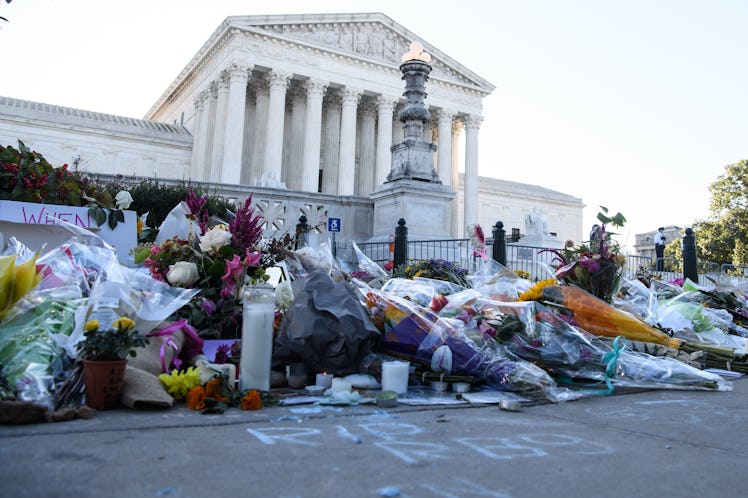
Trump Is Moving Fast To Announce A New Supreme Court Nominee
With barely six weeks to Election Day, President Donald Trump has, yet again, the opportunity to nominate a new justice to the Supreme Court, following the death of Justice Ruth Bader Ginsburg. The timing has both Republicans and Democrats in a tizzy, as Republicans seek to expedite an appointment to the court, while Democrats argue it should wait until after the 2020 presidential election. So, when will Trump announce his Supreme Court nominee? He's certainly not taking his time.
Speaking to Fox & Friends on Monday, Sept. 21, the president said he would announce a nominee on "Friday or Saturday," after services for Justice Ginsburg had concluded. “I think it’ll be on Friday or Saturday and we want to pay respect, it looks like we will have probably services on Thursday or Friday, as I understand it, and I think in all due respect we should wait until the services are over for Justice Ginsburg,” he said, per The New York Times. He also suggested, without any evidence, that Ginsburg's dying wish that she only be replaced after the November election was faked. “I don’t know that she said that, or was that written out by Adam Schiff and Schumer and Pelosi?” Trump said.
Ginsburg, a reliable liberal vote on the Supreme Court who was widely revered as a feminist icon, died on Friday, Sept. 18 at the age of 87, after more than 27 years on the nation's highest court. Her death raises the thorny question of replacing a Supreme Court justice in an election year — something that previously caused problems during the 2016 election cycle, when Justice Antonin Scalia, a reliable conservative vote, died in February of that year. At the time, Republicans in Congress argued that the empty seat should be filled by the incoming president following the 2016 election, and refused to hold a vote on President Barack Obama's nominee, Merrick Garland. Now, four years later, Republicans are eager to replace Ginsburg as quickly as possible ahead of a hotly contested election, while Democrats seek to force Republicans to adhere to their previous stance.
The process to nominate and appoint a Supreme Court justice has multiple steps, but is not terribly complicated. Once the president announces a nominee, the Senate Judiciary Committee holds hearings to interview the nominee. The committee then sends a recommendation to the Senate as a whole, which votes on whether to confirm the nominee. From start to finish, the process generally takes an average of 69 days, or a little over two months, according to the Congressional Research Service, although some notable outliers have taken over three months, while others have taken a little over a month. Ginsburg herself, who was confirmed in a 96-3 vote in 1993, took just 42 days to be approved. If a nominee is announced on Friday, Sept. 25, that gives the Senate just 39 days before the Nov. 3 election to confirm an appointment — cutting it pretty close.
Further complicating the situation is Republicans' tight margin for an approving vote. While it only takes a simple majority to confirm a justice, Republicans hold a slim majority of 53 Senate seats, and two Republican senators — Lisa Murkowski of Alaska and Susan Collins of Maine — have already said they oppose holding a vote ahead of the Nov. 3 election.
On Sept. 9, the White House released additions to a list of potential Supreme Court nominees, and it included prominent names such as Sen. Ted Cruz of Texas and former U.S. solicitor general Noel Francisco. However, following Ginsburg's death, Trump committed to appointing a woman to the bench. This will be Trump's third nomination, following Brett Kavanaugh in 2018 and Neil Gorsuch in 2017.